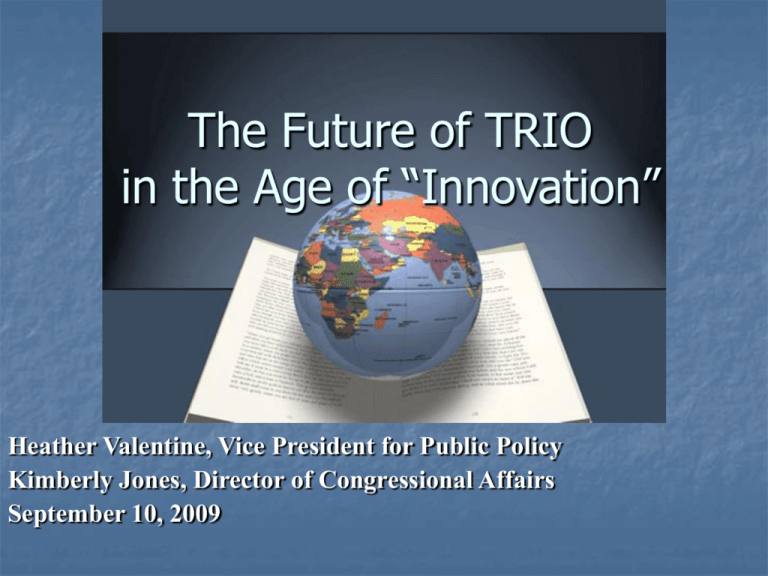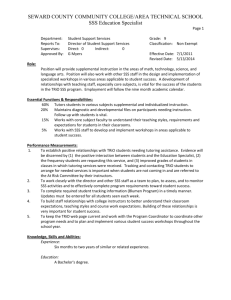TRIO in the Age of Innovation
advertisement

The Future of TRIO in the Age of “Innovation” Heather Valentine, Vice President for Public Policy Kimberly Jones, Director of Congressional Affairs September 10, 2009 TRIO Appropriations Recent Funding History FY 2006 – FY 2008 Level Funding at $828.2 million FY 2009 Omnibus Appropriations Act $19.9 million increase (+ recovered money) $848.1 million total appropriation Increase funded one-time financial aid grants for SSS students (Maximum amount = $20,650) 39 Additional Programs – VUB (7), UBMS (16), and McNair (16) What Does This Mean? Between FY 2005 and FY 2009, TRIO Lost: $77.7 million in funding 34,396 students Approximately 4% Loss of Existing Programs & Students FY 2010 President Obama = Level Funding House Appropriations Committee = $20 million increase Senate Appropriations Committee = Level Funding FY 2010 Outlook Worst Case Scenario $10 million “increase” SSS Competition Results in Loss of: 84 Current Programs 17,550 Current Students Approximately 8% Loss of Existing Students and Programs CAVEAT The Department of Education has approximately $20 million available that is committed for 2009-2010, but not committed thereafter. These funds could be allocated to the SSS competition. What’s the Solution? Senator Blanche Lincoln (D-AR) has committed to offering an amendment to add $50 million to TRIO when the appropriations bill goes to the floor (if the co-sponsors can agree on an “off-set”) Potential Co-Sponsors Blanche Lincoln (D-AR) Susan Collins (R-ME) Jon Tester (D-MT) FY 2010 Outlook (cont.) Best Case Scenario $50 million amendment in Senate $35 million increase overall Sufficient funding to prevent loss of most current SSS grantees and award new grants What YOU Need To Do! We need EVERY Senator to support this amendment! Act immediately All of the TRIO community must be activated: Parents Alumni Students Community Leaders Institutional Leaders & Faculty TRIO Staff “But there’s no money!” There IS Money! House Appropriations Committee Teacher Incentive Fund = $446 million ($349 million above FY 2009) Adult Basic Literary Education State Grants = $628 million ($74 million above FY 2009) Discretionary Pell Grant Funding = $17.8 billion ($495 million above FY 2009) There IS Money! Senate Appropriations Committee School Construction Program = $700 million Teacher Incentive Fund = $300 million ($203 (new program for FY 2010) million above FY 2009) Individuals with Disabilities (IDEA) = $12.6 billion ($1.1 billion above FY 2009) Adult Basic Literary Education State Grants = $628 million ($74 million above FY 2009) Discretionary Pell Grant Funding = $17.5 billion ($207 million above FY 2009) Federal Priorities In just a single generation, America has fallen from second place to eleventh place in the portion of students completing college. That is unfortunate but it is by no means irreversible.... I [call] on Americans to commit to at least one year or more of higher education or career training, with the goal of having the highest proportion of college graduates in the world by the year 2020. President Barack Obama Washington, DC March 10, 2009 Budget Reconciliation What is Budget Reconciliation? Legislative vehicle that affects funding for mandatory programs (e.g., taxes, Social Security, Medicaid, etc.) Governs student loans (which are mandatory) Last used by Congress in 2007 2007 Budget Reconciliation College Cost Reduction and Access Act Amendment by Congressman Robert “Bobby” Scott (D-VA) Provided $57 million to fund 187 Upward Bound projects 2009 Budget Reconciliation TRIO Proposal Part I Provide “incentive grants” to current SSS host institutions that show improvement in retention, transfer, and graduation rates for Pell Grant students 2009 Budget Reconciliation TRIO Proposal Part II Fund new SSS programs Institutions with at least 1,000 Pell Grant recipients Institutions at which Pell Grant recipients comprise at least 40% of undergraduate enrollment Minority-Serving Institutions Glass Half Full “Simply put, the Obama administration’s definition of student aid is far too narrow. What is desperately needed instead is a more comprehensive view of student aid that reflects the recognition that low-income and firstgeneration students face multiple barriers - class, cultural, informational, academic, and social - to postsecondary education, and not just a lack of funds. Merely providing financial resources through mechanisms like the Pell Grant alone will not solve the problem of getting first-generation and low-income students through college.” - Arnold Mitchem Inside Higher Ed June 1, 2009 TRIO Proposal Why SSS? Most of the money saved in the budget reconciliation bill is going to Pell Grants. The services provided by SSS ensures that Pell Grants are well-spent and result in transfer and graduation. SSS addresses the goal of the Obama Administration to make America first in the world for postsecondary completion. TRIO Proposal Impact on TRIO? Makes TRIO central to institutional plans to retain and graduate students. Major expansion in TRIO presence. Increases size of current programs and number of students served. Questions and Answers







